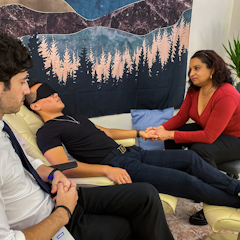
Artículos sobre Race
Mostrando 1 - 20 de 601 artículos

Legal rulings throw fate of special scholarships for ethnic minorities into doubt.

Legal precedents hold that criminalizing someone for their status, such as being homeless, is cruel and unusual punishment. But what if that status leads to actions like sleeping in public spaces?

Since the ‘trial of the century,’ the lines between news and entertainment have become increasingly blurred.

Diversity, equity and inclusion are good for the bottom line.

A stained-glass window, which shows Jesus as a Black man for the first time, tells a story not only of race but of gender, class and ethnicity.

Confinement was the essence of Linda Martell’s brief career as a country star in the 1970s – and it’s the exact sort of fate that Beyoncé has sought to avoid.

Mapping where water once flowed is important for managing flood risk today in Detroit and elsewhere.

It’s been nine years since #OscarsSoWhite called out a lack of diversity at the Oscars. Has anything changed? Prof. Naila Keleta-Mae and actress Mariah Inger unpack the progress.

The DCMR team has been busy prepping new episodes and next week, we start releasing episodes for season 7, taking our anti-racist lens to the news and issues occupying a lot of our minds these days.

Rather than leave the Treaty principles to parliament and the courts to define, why not embed the essence of the Treaty articles themselves in all laws?

Her new album, ‘Cowboy Carter,’ arrives at a moment when country music’s reputation as overwhelmingly white is finally starting to crack.

Scholars say Israel’s destruction of Gaza’s schools, universities and museums are part of an ongoing project to destroy Palestinian people, identity and ideas.

The work remains a crowd favorite. But more and more scholars are starting to see ‘Rhapsody’ as a whitewashed version of Harlem’s vibrant Black music scene.

Black travelers want the tourism industry to recognize their full identity. That will require more than procedural checkboxes and targeted advertising.

As in the federal and state governments, local elected officials are more likely to be white than their constituents. At times, such as with school boards, the differences are particularly stark.

The release of ‘American Fiction’ presents an opportunity to talk about race, power and white supremacy: What version of Blackness is acceptable or saleable within American culture?

In this episode, Vinita sits down with two experts to break down the many layers — and Black stereotypes — in the much anticipated new film, ‘American Fiction.’

Impact of Race and Culture Assessments can reduce the overrepresentation of Black people in the justice system.

Clinical psychologist and professor Monnica Williams is on a mission to bring psychedelics to therapists’ offices to help people heal from their racial traumas. To do this, she’s jumping over some big hurdles.

Despite public calls to defund the police in 2020, the budgets of Canadian police forces have continued to rise.
